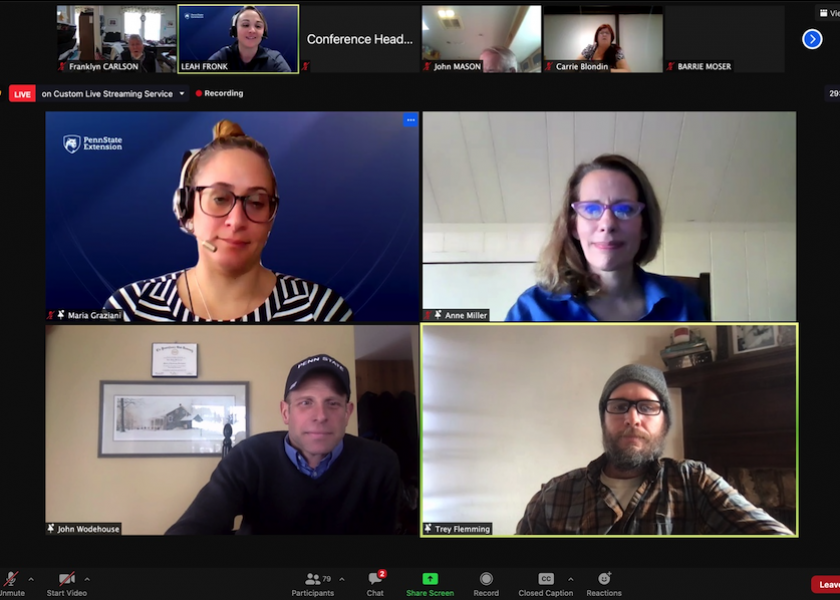How to ensure online, distribution, delivery services are profitable

There are several ways to ensure profitability when considering whether to add distribution or delivery services to your company.
Those same methods also can help you evaluate whether the services you already offer are making you money.
Several business management and accounting educators from Penn State University Cooperative Extension provided these tools, tips and strategies in their education sessions on the second day of the Feb. 8-11 virtual Mid-Atlantic Fruit and Vegetable Convention.
“Convenience is a trend that is not going away,” said Maria Graziani, who led a session e-commerce platforms, social media and email marketing options. “I would not ignore this trend of food convenience through online sales and delivery.”
Cropolis is a platform that helps farmers manage online sales directly to consumers, and Harvie helps farmers connect to their local market and grow sales with a technology platform that makes it convenient for consumers to buy from local farmers, Graziani said.
SquareUp and Local Food Marketplace also help growers manage the new logistics of online and cashless sales.
Regardless, you must do your research and a break-even analysis, Graziani said. The extension offers calculators for budgeting ag and marketing decision-making.
Trey and Dierdre Flemming of Downingtown, Pa.-based Two Gander Farm, grow organic produce that they sell at farmers markets, wholesale grocery chains and through 200 community-supported agriculture memberships.
It became hard to keep track of where the sales revenue was coming from when they added more revenue streams during the pandemic, such as online pre-ordering for farmers market customers, plus online pre-ordering and pre-paying with on-farm curbside pickup.
“Treat it as a separate business. It’s not farming business; it’s a distribution business,” Trey Flemming said.
They also had to be strategic about marketing their business on social media.
“We’re fairly reluctant social media users. It’s not our favorite part of farming, or marketing even,” Flemming said. “Instead of trying to put out a lot of content, Diedre, she spends a lot more time and energy putting out quality content. When she does put out a Facebook or Instagram post, there’s a lot of thought put into it, so it’s well written and has great photography. It’s about quality.”
Annie Miller led a session about longterm cost considerations and knowing when to trim a business plan.
First off, no matter the business size, you have to offer some sort of delivery, she said.
“If you’re not delivering the product, they’re going to go somewhere else, and that’s the God-honest fact,” Miller said.
You should make sure that you’re taking the time to understand your credit card fees and how that affects your profitability.
See where you could be losing money in shipping and packaging costs, she said.
And a website is a must.
“A website, sometimes it’s a huge undertaking when you’d rather be out farming or doing something you’re good at,” Miller said. “It’s expensive and difficult to maintain.”
But if your customers cannot find you, you’re not going to be able to sell, so it’s important to maintain some sort of web presence and some sort of e-commerce channel, Miller said.
See which channels are best for your type of business: curbside pickup, self-delivery, drop shipping or partnerships, Miller said.
“Just pick one channel, and do it well before really giving up completely,” she said.
Sometimes a higher cost can work for you, said John Wodehouse of Penn State Extension.
Large, nationwide shippers have received customer feedback that they liked having a choice of shipping material, he said.
“It gives us the opportunity to look at environmental stewardship, versus cost, versus profit maximization when we’re shipping across the country,” Wodehouse said. “You can send out a customer survey and find out what they want and then put it into that cost recovery model and see if the added expense is a pass-along to the consumer or if we can absorb it.”
When exploring the new ways to market your products and get it to your customer, remember to prioritize your own peace of mind.
“Lastly, you have to think if you hate it, if an element of your business makes you miserable and unhappy, life is short. You get to make those decisions as a business owner,” Miller said. “Can you eliminate e-commerce completely? Absolutely not. But you can focus on the channels that work for you, that work for your business.”







